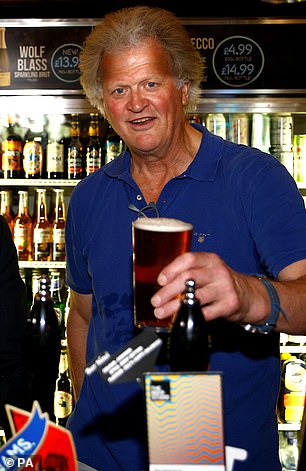Glass full: Wetherspoons chief Tim Martin has had his pay topped up
Wetherspoons boss Tim Martin is back on full pay after taking a pandemic pay cut – despite the pub chain crashing to its first annual loss since 1984.
The pubs group’s founder and chairman slashed his £324,000-a-year salary in half in March but his pay quietly went back up again in August, The Mail on Sunday can reveal. Chief executive John Hutson and the rest of the Wetherspoons board also join a host of crisis-hit executives who have put their pay back up after accepting reduced salaries in March.
The MoS last week revealed the bosses at struggling easyJet and hotels group Intercontinental were among those to move back to full pay. Martin’s pay boost could prove controversial as the hospitality industry faces being hammered by the second wave of lockdowns taking effect across Britain this winter.
Rival pub group Marston’s on Thursday announced 2,150 job cuts and joined bosses from Greene King, Fuller’s, Young’s and Mitchells & Butlers to warn that many pubs will be left ‘unviable’ by restrictions that bar millions of households from mixing.
Pubs and restaurants were among the last businesses to be allowed to reopen after the first lockdown, on July 4, and have struggled to cope as social distancing measures – including only offering table service, the rule of six and a 10pm curfew – have limited trade.
Wetherspoons, which has nearly 900 pubs, on Friday revealed it had plunged into the red last financial year, collapsing to a £105.4million loss from a £95.4million profit the year before.
Revenues evaporated as pubs were forced to shut in lockdown, and the company said that strong sales growth after reopening had been stymied by the introduction of a curfew.
Martin, who founded the company in 1979, used the results to lambast the Government’s approach to lockdown, hitting out at an ‘ever-changing raft of ill-thought-out regulations’. The keen Brexiteer has hit the headlines several times since the virus outbreak – being accused of attempting to keep his pubs open against Government orders, not paying staff for work completed and telling staff to work at Tesco – all claims which he denies.
The pubs chief’s pay boost may anger its 43,000 employees after 108 staff were made redundant from its head office, and 450 who work at six of its UK airport bars put at risk of losing their jobs.
It can also be revealed that property giant British Land and manufacturer Johnson Matthey are among those who have seen executives reverse their pay cuts.
Directors at £3billion landlord British Land cut their pay by 20 per cent from April to July to pay into the firm’s charitable fund. The commercial property company has faced a collapse in office use and many retailer tenants refusing to pay rent. Bosses at Johnson Matthey, the FTSE100 catalytic convertor maker, took a 20 per cent cut from April to June to pay into a science education fund.
In June, the car industry supplier revealed plans to cut 2,500 jobs worldwide over three years to cope with the fallout from the pandemic. Lucy Powell MP, shadow minister for business and consumers, said: ‘Reports of rising executive pay will be a bitter pill to swallow for many low-paid key workers who have played a vital role during this coronavirus crisis, and for the many people who have lost their jobs.’
She added: ‘We are in the middle of a deep recession and unemployment crisis. The Government must do what is right – put the right support in place to save jobs and make sure those on low incomes who have worked so hard to keep our country going get the pay they deserve.’
Sarah Wilson, chief executive of corporate governance consultancy Minerva Analytics, said: ‘Investors are already challenging investee companies to use Covid-19 as an opportunity to reset their thinking on a whole range of environmental, social and governance issues, and pay is one part of that. All too often, pay has been focused on pure financial metrics, without thinking about the wider impact on stakeholders, workforce, suppliers, the climate.
‘What Covid-19 is showing us is that there is now no such thing as normal. What happened in the past has little bearing on what happens next. Companies that aren’t taking Covid-19 as an opportunity to pivot towards a values-based approach to strategy and reward aren’t going to make it in the long term.’
The British Beer and Pub Association claims that 290,000 jobs are at risk in an industry where 43 per cent of employees are under 25. More than a quarter of Britain’s 39,700 pubs may not survive the pandemic, it is estimated.
Around 14,000 sites are owned by big groups with multiple pubs, including Wetherspoons. The remainder are run by small chains and single landlords and are seen as the most likely to shut imminently.
Wetherspoons raised £141million through a share placing in June to shore up its balance sheet amid the virus crisis.
Martin declined to comment on his pay.
Some links in this article may be affiliate links. If you click on them we may earn a small commission. That helps us fund This Is Money, and keep it free to use. We do not write articles to promote products. We do not allow any commercial relationship to affect our editorial independence.
